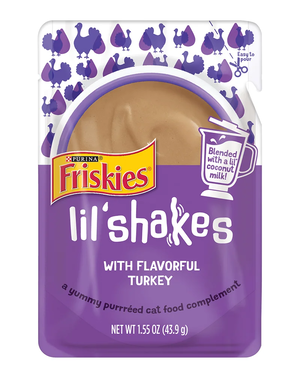Purina Friskies Lil' Shakes With Flavorful Turkey Review
PawDiet has been helping pet owners since 2015. To fund our efforts, articles may include affiliate links; if you buy something through a link, we may earn a commission.
Review of Purina Friskies Lil' Shakes With Flavorful Turkey
According to our most recent data, this product is intended for intermittent or supplemental feeding only.
Review of Ingredients
In our review of Purina Friskies Lil' Shakes With Flavorful Turkey, we'll examine all 11 ingredients and highlight the nutritional contribution of each ingredient.
While the first few ingredients typically dominate the recipe's composition, ingredients in small quantities can still have a meaningful impact on the overall nutritional profile of the recipe.
Turkey Broth is a flavorful and nutritious liquid that helps to keep your cat's food moist and palatable. It provides essential nutrients like proteins, vitamins, and minerals, which contribute to overall health and wellbeing.
Turkey is a lean, highly digestible protein source that provides essential amino acids, vitamins, and minerals for your cat's overall health and well-being.
Liver is a nutrient-dense organ meat, providing a great source of protein, vitamins and minerals, especially Vitamin A, which is essential for your cat's eye health.
Modified Corn Starch is a carbohydrate source that provides energy for your cat's daily activities. This ingredient also acts as a thickening agent, helping to maintain the texture and consistency of the cat food.
Coconut milk is a source of healthy fats and can help maintain a healthy coat and skin in cats.
Artificial flavors are used to enhance the taste of cat food, making it more appealing to your pet.
Natural flavor enhances the palatability of the cat food, making it more appealing to finicky eaters.
Taurine is an essential amino acid that plays a crucial role in your cat's heart function, vision, and reproduction. Cats cannot synthesize taurine in sufficient amounts, making it a vital addition to their diet.
Guar Gum is a natural thickening agent and stabilizer, which helps to maintain the texture and consistency of wet cat food while also providing a source of soluble fiber for digestive health.
Salt is added in small amounts to cat food to help maintain electrolyte balance and support healthy nerve and muscle function.
Thiamine mononitrate is a source of Vitamin B1, essential for energy metabolism and nervous system function in cats.
Review of Guaranteed Analysis
Crude Protein (min) of 3.00%: The crude protein content is primarily derived from the turkey and liver ingredients listed. These are animal-based proteins and are the most significant contributors to the protein content in the pet food. Turkey, being the main flavor and a key ingredient, along with liver, which is rich in protein, ensures that the product meets the minimum requirement for protein necessary for a cat's diet.
Crude Fat (min) of 1.00%: The crude fat content comes from the natural fats present in the turkey and liver. Although the percentage is quite low, these ingredients naturally contain some fat which contributes to this value. Additionally, coconut milk may also contribute a small amount of fat to the product, albeit it's not typically a significant source of fat in pet foods.
Crude Fiber (max) of 1.00%: The crude fiber content is likely to be very low in this product, as animal-based ingredients such as turkey and liver do not contain fiber. The fiber that is present may come from the corn starch-modified or guar gum, both of which can contain some dietary fiber. However, since these ingredients are not primarily used for their fiber content, the overall fiber percentage remains low.
Calories of 439.00 per kg: The caloric content is a measure of the energy provided by the food. The turkey and liver will contribute to the calorie content through their protein and fat, while the corn starch-modified and coconut milk may also contribute some calories through carbohydrates and fat, respectively. The caloric value is important for maintaining the energy requirements of the pet.

